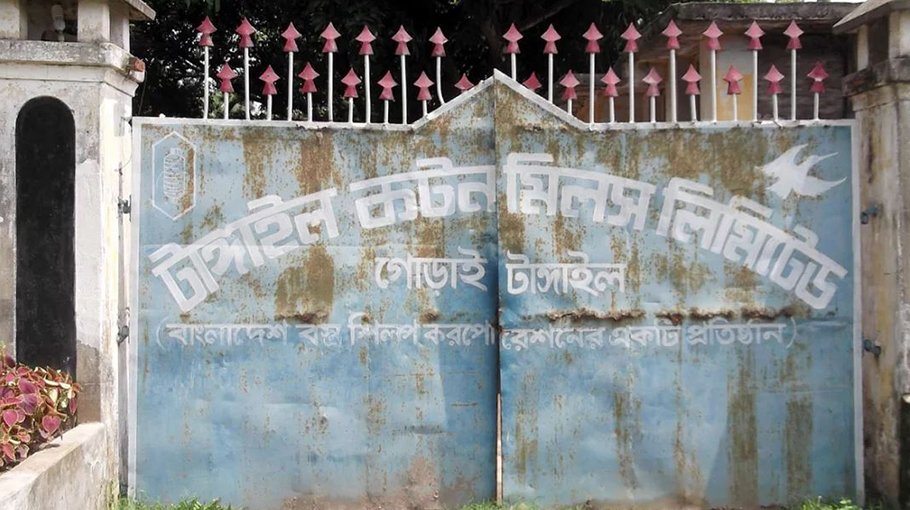Debt-ridden Tangail Cotton Mills remain closed for 16 years

The Tangail Cotton Mills, a yarn production facility located in the Gorai industrial area in Mirzapur upazila of Tangail, has remained closed for 16 years.
This mill, under the Ministry of Textiles and Jute and operated by the Bangladesh Textile Mills Corporation, was the only state-owned yarn production facility in the region. However, it has remained closed due to debt for the past two decades.
As a result, the machineries worth hundreds of crores Taka is being stolen, and the buildings are deteriorating as well. It has also been reported that valuable land within and around the mill is being illegally occupied. The closure of this vast yarn production facility has rendered 3,000 to 4,000 workers and employees jobless, leaving them and their families in dire conditions.
Local residents said that the government had plans to reopen the Tangail Cotton Mills under the Public-Private Partnership (PPP) model. However, due to bureaucratic red tape, the mill has not been operational yet.
During a visit to the Tangail Cotton Mills area on the Dhaka-Tangail highway in Gorai, Mirzapur, it was seen that silence prevailed over the mill as activities had been suspended a long time ago. The hustle and bustle of workers and employees were absent, and the main gate of the mill stood as a quiet reminder of the past.
According to sources from Tangail Cotton Mills, the facility spans 26.285 acres and began operations in 1962 with its first unit. It was the first state-owned yarn production mill in the Gorai industrial area of Mirzapur upazila. The mill used to come alive with the sound of workers and employees starting their tasks as soon as the whistle blew. Due to high production output, a second unit was inaugurated in 1978. The mill produced high-quality yarn of 80, 60, 70, and 40 counts, which was exported domestically and internationally, earning significant foreign currency for the government. The two units employed around 4,000 workers and employees, providing them with livelihoods. The mill’s success turned the area into a bustling hub from dawn until late at night, surrounded by facilities like a secondary school, a primary school, a madrasa, a post office, and a rural electricity substation. However, these establishments are now on the verge of closure due to the mill's shutdown, and the number of unemployed individuals in the area is increasing.
Former mill employees, including Babul Sikder and Abdur Rahman Subadar, alleged that mismanagement and corruption by some dishonest mill officials, employees, and CBA leaders led to the mill's financial downfall between 1985 and 1990. Due to the syndicate of officials and leaders of Collective Bargaining Agent (CBA), the mill became burdened with debt, causing the second unit to shut down in 1998. This closure left about 2,000 workers and employees unemployed. Although the first unit continued operating for some time, it eventually closed in 2008 due to losses.
They further said that the complete shutdown of both units has left 3,000 to 4,000 workers and employees jobless, forcing them and their families into a miserable state. The machineries worth several hundred crore Taka are being damaged with time, and the buildings have already become highly unsafe. Additionally, there have been allegations of influential individuals seizing portions of the mill's property.
It was learnt that 10 to 12 daily wage employees, led by a chief executive, are maintaining the mill currently. Former employees believe that reopening the mill under the Public-Private Partnership (PPP) model would create new employment opportunities for many unemployed individuals in the area and generate significant profits for the government.
Regarding the matter, Mizanur Rahman, the Chief Executive (Mill In-Charge) of Tangail Cotton Mills, said, tangail Cotton Mills was the first yarn production facility under the Bangladesh Textile Mills Corporation of the Ministry of Textiles and Jute. Due to losses, the mill was closed, leading to an increase in unemployment among workers in the area. While there was an initiative to reopen the mill under the Public-Private Partnership (PPP) model, it has not yet materialized. If the government takes steps, it would be possible to reopen the mill. However, in the meantime, machineries worth hundreds of crores Taka is being damaged, and a significant amount of property is gradually falling into the hands of illegal occupiers.



